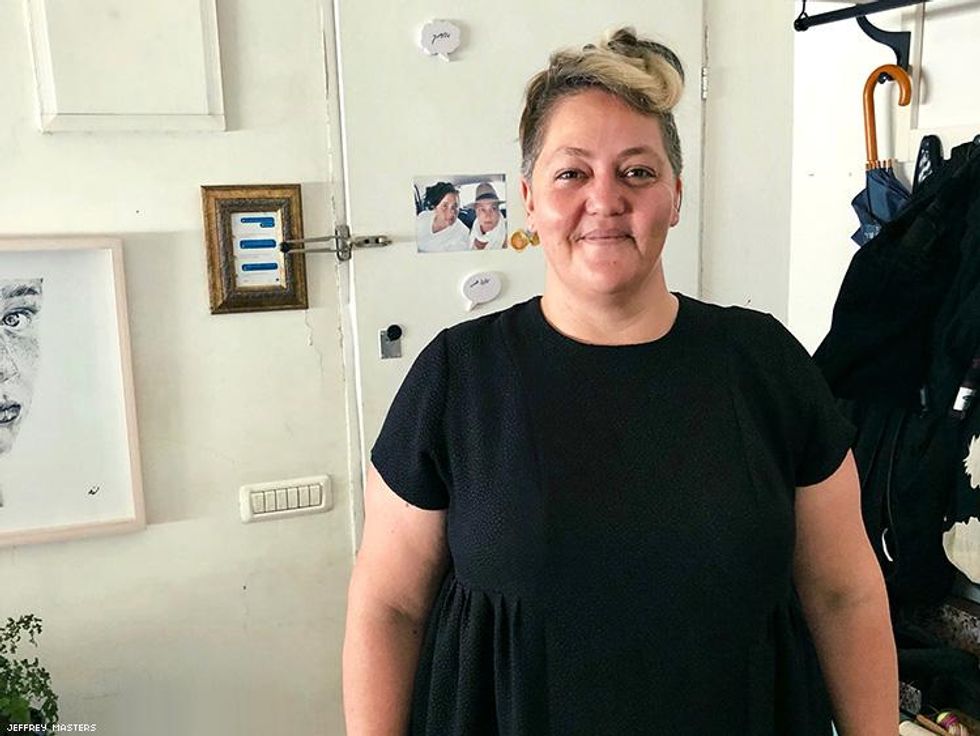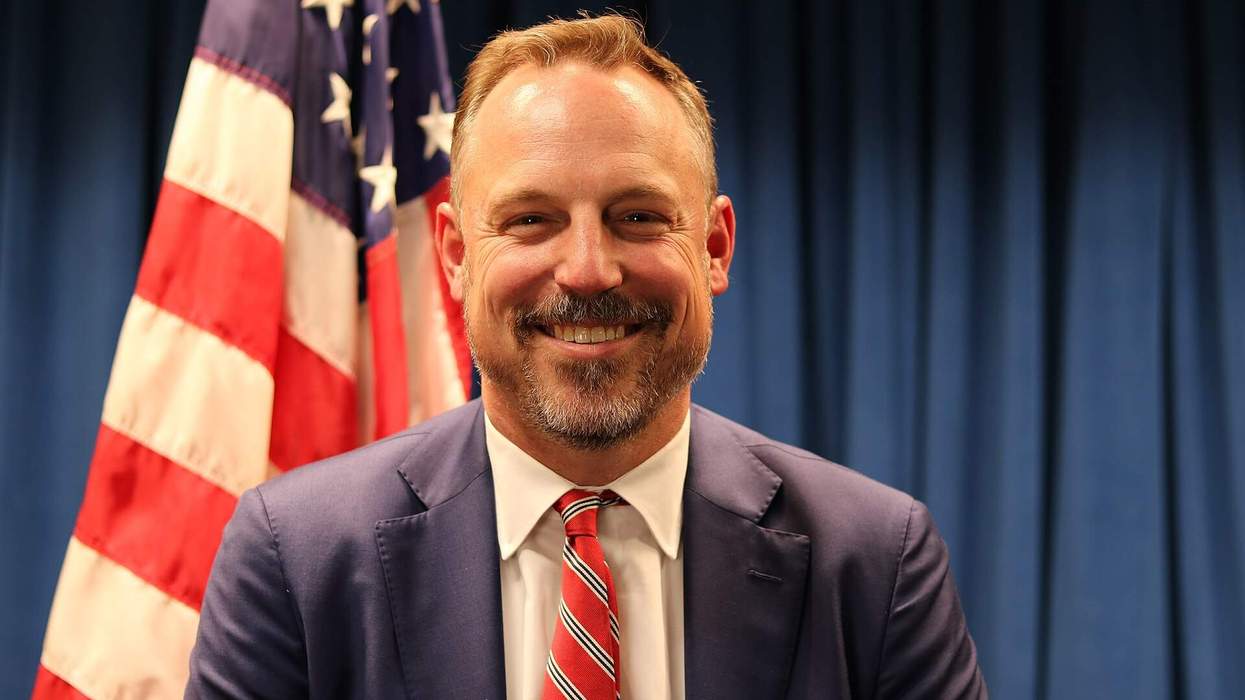This interview was conducted as part of the series LGBTQ&A, a weekly podcast that documents modern queer and trans history.
Before becoming the deputy mayor of Tel Aviv, Israel -- the first openly gay person to hold the post and one of only a few women -- Chen Arieli was an activist, one of the most visible and influential in the country.
Now adjusting to life as a public official, Arieli discusses a broad range of topics on this week's LGBTQ&A podcast, such as working behind the scenes to assure that 2018 protests against Israel's discriminatory surrogacy law included other issues and to why the treatment of trans people is such an urgent matter in the nation.
"If you want to write history, you need to be brave with what you think," she says.
[Click here to listen to the full podcast interview with Chen Arieli.]
Jeffrey Masters: I think it's a big deal for such a big city in the Middle East to have a lesbian in this role. Does it feel that way to you?
Chen Arieli: Yes and no. It's the first time that we've had a deputy mayor that is openly lesbian. It's a wow, of course, but I think more because I'm a woman, and women in the LGBT community are, most of the time, an aside.
In Israel, a woman's position isn't good, because we've had a backlash and we are going backward. When you compare it to Iraq and Iran and Jordan, women's status here is great. But we still don't have gender equality in general.
Does a lot of that come back to the power that these ultraconservative groups in the government have?
Yeah. The core subject of Israeli society, and not just in the terms of LGBT rights, is the lack of separation between religion and the state. Religion is managing our lives.
And Judaism is a really wide movement. There's not just one way to practice Judaism. We're not in the old ages anymore. I can choose the way I practice my beliefs, and my beliefs are freedom and choice and peace and safety.
One thing I'm doing in my life is performing alternative ceremonies for weddings. It's an act of activism against the rabbinical system that forces you to get married through this really old and hard system. There are women in Israel that are not allowed to get a divorce even though their husbands are doing really horrible things to them because the rabbinical system is based on Shalom bayit [a religious concept of marriage].
Even if you complain that your husband is hitting you or is financially abusive, the rabbinical system won't give you a divorce. You need to explain why and you need the approval of the rabbinical system.
And that's for every marriage, gay or straight.
That's for every marriage, and it's a horrible process. It's really harsh. The rabbinical system is running our lives.
I don't have anything against God or against Judaism. I practice my life really secularly, and the values that motivate me are values that exist in the core of Judaism. The narrative must be wider.
So why did you then choose to get married?
I'm not married. I call Halit my wife because it's easier. You understand what she means in my life. Because she's the love of my life and she's the woman that I choose to live my life with. So she's my wife in the modern, common word.
I perform ceremonies for others because it's a part of my fight as an activist. As long as we are not allowed to get married in Israel, I feel obligated to provide an alternative. And by performing ceremonies, I have to admit, I've reconnected to that. I can really emotionally understand the need of people to tie knots where it's not allowed by the country. It's a revolutionary note.
And the next step of it is to understand that we don't need it because our love is our love. And we're here to stay. And you have almost 40,000 LGBT families in Israel. You cannot ignore us.
You helped to lead a protest last year, one of the largest in Israel's history, specifically defending gay men's right to have kids through surrogacy. Is that one of the focuses of the LGBTQ movement here?
It's not the most urgent problem. Transgender people are still really unsafe in the public arena. It's the most sensitive community for suicide and for violence and for oppression and discrimination.
It's a wider example of Israeli culture and why we succeeded in having the biggest demonstration ever. Because the most core value in Israel society is family, no matter which community you're coming from. We strategically used that to promote this big demonstration.
That's always what pulls us out to the streets: gay issues, not lesbian, trans, bisexual, queer [issues]. We come out to the streets for white privileged reasons.
So we decided to use that foot in the door to really do something huge that would help all the other letters at the LGBT community. You know, the big rally we had in Rabin Square, we had 100,000 people.
That's massive.
What happened is that we knew that a big demonstration wouldn't be enough, so we decided to pull off a strike.
Now, you have to understand, the only way that you can strike in Israel is if you're a workers' union. We are not the workers' union, so it was against the law. We took a big chance around it because it could have been a big flop. Everyone told us, 'It won't work. It won't catch. It won't be viral.'
The CEO of the Aguda [the Israeli LGBTQ task force] and me were like talking and we said no. We felt that it wasn't enough to go out to the street. It's not enough. We needed to give our communities something to do that they couldn't resist.
Everything was boiling and then we just pulled up a Facebook event, named it "The Israel LGBT Community Is Striking." Come strike with us. And what happened after that was history because we had over 300 companies supporting our strike, saying if you're my employee and you're gay and you want to strike that day, I support you.
In America, you have the business sphere supporting the LGBT cause. In Israel they're so scared to do so because of the religious sector.
So the anger from the surrogacy law is what got people into the streets, but it was about more than just that.
It's important for me to mark that as a feminist. I understood the political opportunity that we had last summer because I had the power to stop it. But if I would've stopped it, we wouldn't have this written in history.
And it's true. We came out to the street for a privileged white gay reason, but on the stage in front of 100,000 people broadcasted live in four channels, more than half a million people were watching, and six out of 12 speakers on the stage were trans.
Out of 12, we had just one talking about surrogacy. We had an elderly trans woman, one of the pioneers from the trans community in Israel. This really brave young transgender female spoke and shouted her pain, and this speech got into so many houses. This for me is radical.
I think we need to be much more political and smart in our fight, not just in Israel, all over the world. If you want to write history, you need to be brave with what you think.
I know that the transgender community might be angry with me that I didn't say let's do a big rally about the transgender woman that was almost beaten to death, but it doesn't mean that I wasn't working for her, especially in my new position at the municipality because I'm in charge of the welfare and public health administration in the Tel Aviv municipality.
It sounds gross, but the reality is that framed as a march for trans rights, fewer people would show up.
Politics, in the dictionary, means power positions.
For me being a lesbian, it's a political act because I'm trying to change the power positions that now are 100 percent geared towards heterosexuals. I want to change that.
[Click here to listen to the full podcast interview with Chen Arieli.]
New episodes of LGBTQ&A come out every Tuesday, only on the Luminary app. Click here to listen.
This interview is the third installment in LGBTQ&A's four-part series exploring queerness and Jewish life. Click here to listen to Rabbi Denise Eger discuss coming out of the closet during the early days of the AIDS crisis and click here to listen to Uzi Even, Israel's first openly gay member of Parliament.
















Charlie Kirk DID say stoning gay people was the 'perfect law' — and these other heinous quotes
These are some of his worst comments about LGBTQ+ people made by Charlie Kirk.